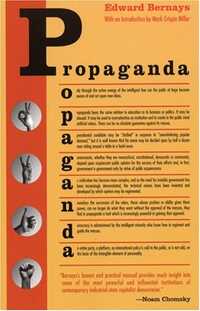
Propaganda
Chapter 2
The New Propaganda
- Author :: Edward Bernays
- Publication Year :: 1928
- Posted: June 28, 2024
Important
Very important
Chapter 2 - The New Propaganda
page 13:
-
In the days when kings were kings, Louis XIV made his modest remark, “L’Etat c’est moi." He was nearly right.
-
“I am the state."
-
But times have changed. The steam engine, the multiple press, and the public school, that trio of the industrial revolution, have taken the power away from kings and given it to the people. The people actually gained power which the king lost For economic power tends to draw after it political power; and the history of the industrial revolution shows how that power passed from the king and the aristocracy to the bourgeoisie. Universal suffrage and universal schooling reinforced this tendency, and at last even the bourgeoisie stood in fear of the common people. For the masses promised to become king.
-
To-day, however, a reaction has set in. The minority has discovered a powerful help in influencing majorities. It has been found possible so to mold the mind of the masses that they will throw their newly gained strength in the desired direction. In the present structure of society, this practice is inevitable.
page 14:
-
Whatever of social importance is done to-day, whether in politics, finance, manufacture, agriculture, charity, education, or other fields, must be done with the help of propaganda. Propaganda is the executive arm of the invisible government
-
Universal literacy was supposed to educate the common man to control his environment. Once he could read and write he would have a mind fit to rule. So ran the democratic doctrine. But instead of a mind, universal literacy has given him rubber stamps, rubber stamps inked with advertising slogans with editorials, with published scientific data, with the trivialities of the tabloids and the platitudes of history, but quite innocent of original thought. Each man’s rubber stamps are the duplicates of millions of others, so that when those millions are exposed to the same stimuli, all receive identical imprints.
-
I am aware that the word “propaganda” carries to many minds an unpleasant connotation. Yet whether, in any instance, propaganda is good or bad depends upon the merit of the cause urged, and the correctness of the information published.
page 15:
-
I find the word defined in Funk and Wagnalls’ Dictionary in four ways:
-
“A society of cardinals, the overseers of foreign missions; also the College of the Propaganda at Rome founded by Pope Urban VIII in 1627 for the education of missionary priests; Sacred College de Propaganda Fide.
-
Hence, any institution or scheme for propagating a doctrine or system.
-
Effort directed systematically toward the gaining of public support for an opinion or a course of action.
-
The principles advanced by a propaganda.”
-
-
The Scientific American, in a recent issue, pleads for the restoration to respectable usage of that “fine old word ‘propaganda.’”
-
“There is no word in the English language,” it says, “whose meaning has been so sadly distorted as the word ‘propaganda.’ The change took place mainly during the late war when the term took on a decidedly sinister complexion.
-
World war 1.
-
These next quotes are from Scientific American:
-
“If you turn to the Standard Dictionary, you will find that the word was applied to a congregation or society of cardinals for the care and oversight of foreign missions which was instituted at Rome in the year 1627. It was applied also to the College of the Propaganda at Rome that was founded by Pope Urban VIII, for the education of the missionary priests. Hence, in later years the word came to be applied to any institution or scheme for propagating a doctrine or system.
page 16:
-
“Judged by this definition, we can see that in its true sense propaganda is a perfectly legitimate form of human activity. Any society, whether it be social, religious or political, which is possessed of certain beliefs, and sets out to make them known, either by the spoken or written words, is practicing propaganda.
-
“Truth is mighty and must prevail, and if any body of men believe that they have discovered a valuable truth, it is not merely their privilege but their duty to disseminate that truth. If they realize, as they quickly must, that this spreading of the truth can be done upon a large scale and effectively only by organized effort, they will make use of the press and the platform as the best means to give it wide circulation. Propaganda becomes vicious and reprehensive only when its authors consciously and deliberately disseminate what they know to be lies, or when they aim at effects which they know to be prejudicial to the common good.
-
“‘Propaganda’ in its proper meaning is a perfectly wholesome word, of honest parentage, and with an honorable history. The fact that it should to-day be carrying a sinister meaning merely shows how much of the child remains in the average adult. A group of citizens writes and talks in favor of a certain course of action in some debatable question, believing that it is promoting the best interest of the community. Propaganda? Not a bit of it. Just a plain forceful statement of truth. But let another group of citizens express opposing views, and they are promptly labeled with the sinister name of propaganda.
page 17:
-
“‘What is sauce for the goose is sauce for the gander,’ says a wise old proverb. Let us make haste to put this fine old word back where it belongs, and restore its dignified significance for the use of our children and our children’s children.”
-
Scientific American carrying water 100 years ago. Even better is that they literally use the “for the children” “argument."
-
The extent to which propaganda shapes the progress of affairs about us may surprise even well informed persons. Nevertheless, it is only necessary to look under the surface of the newspaper for a hint as to propaganda’s authority over public opinion. Page one of the New York Times on the day these paragraphs are written contains eight important news stories. Four of them, or one-half, are propaganda. The casual reader accepts them as accounts of spontaneous happenings. But are they? Here are the headlines which announce them: “TWELVE NATIONS WARN CHINA REAL REFORM MUST COME BEFORE THEY GIVE RELIEF,” “PRITCHETT REPORTS ZIONISM WILL FAIL,” “REALTY MEN DEMAND A TRANSIT INQUIRY,” and “OUR LIVING STANDARD HIGHEST IN HISTORY, SAYS HOOVER REPORT.”
page 18:
-
Take them in order: the article on China explains the joint report of the Commission on Extraterritoriality in China, presenting an exposition of the Powers’ stand in the Chinese muddle. What it says is less important than what it is. It was “made public by the State Department to-day” with the purpose of presenting to the American public a picture of the State Department’s position. Its source gives it authority, and the American public tends to accept and support the State Department view.
-
The report of Dr. Pritchett, a trustee of the Carnegie Foundation for International Peace, is an attempt to find the facts about this Jewish colony in the midst of a restless Arab world. When Dr. Pritchett’s survey convinced him that in the long run Zionism would “bring more bitterness and more unhappiness both for the Jew and for the Arab,” this point of view was broadcast with all the authority of the Carnegie Foundation, so that the public would hear and believe. The statement by the president of the Real Estate Board of New York, and Secretary Hoover’s report, are similar attempts to influence the public toward an opinion.
-
These examples are not given to create the impression that there is anything sinister about propaganda. They are set down rather to illustrate how conscious direction is given to events, and how the men behind these events influence public opinion. As such they are examples of modern propaganda.
-
You can say they aren’t sinister. Maybe the people making the statements believe what they are saying, but that doesn’t mean their take is accurate. While you can’t publish the whole of the survey or every detail about every story, you can at least give air-time to all sides of a case. Then interested parties could look deeper into the actual source material. Not everyone would look at every issue, but if everyone looked at SOME issue and discussed it with their peers a consensus could be reach. That said, a consensus does not mean it is still “right”.
page 19:
-
At this point we may attempt to define propaganda.
-
Modern propaganda is a consistent, enduring effort to create or shape events to influence the relations of the public to an enterprise, idea or group.
-
Only a few paragraphs ago Bernays was extolling Scientific American for saying: “Truth is mighty and must prevail.” I guess creating or shaping “truth” should be redefined as “whatever the authors and perceived authorities say”?
-
The important thing is that it [propaganda] is universal and continuous; and in its sum total it is regimenting the public mind every bit as much as an army regiments the bodies of its soldiers.
-
So vast are the numbers of minds which can be regimented, and so tenacious are they when regimented, that a group at times offers an irresistible pressure before which legislators, editors, and teachers are helpless.
-
So now he is trying to say the people, after being sufficiently propagandized, have power over the legislators, etc. He unsurprisingly ignores that the tune the people are marching to is not their own and was implanted by the propagandists. Remember back to chapter 1’s opening paragraph:
-
The conscious and intelligent manipulation of the organized habits and opinions of the masses is an important element in democratic society. Those who manipulate this unseen mechanism of society constitute an invisible government which is the true ruling power of our country.
-
We are governed, our minds are molded, our tastes formed, our ideas suggested, largely by men we have never heard of.
-
-
The legislators mentioned in chapter 2 are not the “real” legislators. The “real” legislators are the invisible governors of the invisible government. Funny how Bernays talks out of both sides of his mouth depending on what he wants you to believe. Typical propaganda.
-
The group will cling to its stereotype as Walter Lippmann calls it, making of those supposedly powerful beings, the leaders of public opinion, mere bits of driftwood in the surf.
-
When an Imperial Wizard, sensing what is perhaps hunger for an ideal, offers a picture of a nation all Nordic and nationalistic, the common man of the older American stock, feeling himself elbowed out of his rightful position and prosperity by the newer immigrant stocks, grasps the picture which fits in so neatly with his prejudices, and makes it his own. He buys the sheet and pillow-case costume, and bands with his fellows by the thousand into a huge group powerful enough to swing state elections and to throw a ponderous monkey wrench into a national convention.
-
Which is it Ed? Does the KKK cling to stereotypes and throw a monkey wrench into the works or is the KKK led by propaganda? By “ideas suggested largely by men we have never heard of."
-
Further, he constantly makes the point that society MUST be organized by propaganda to get anything done. Does the KKK, assuming they are following their own thinking and not propaganda, not disprove this “must?” Are they not organized? You might argue that the KKK itself is employing propaganda, but then that begs the question of which group is correct. Following Bernays path this would be decided by the “invisible governors” and not the people presented with the facts/truth.
-
We can see this struggle still today. The New York Times (Bernays example newspaper) constantly calls large swaths of the population “right wing extremists” for questioning immigration or the economy while simultaneously painting a picture of the black lives matter protests as “mostly peaceful”. Fake new. Misinformation. Propaganda. Nothing new under the sun.
-
Doubly so nothing new since 100 years ago the example Bernays gives is nationalists (right wing extremists) vs immigrants.
page 20:
-
In our present social organization approval of the public is essential to any large undertaking. Hence a laudable movement may be lost unless it impresses itself on the public mind. Charity, as well as business, and politics and literature, for that matter, have had to adopt propaganda, for the public must be regimented into giving money just as it must be regimented into tuberculosis prophylaxis.
-
If this was true, times have changed. How many of these wars, bailouts, and other shenanigans have the people been against and they still happen?
-
Who decides what is laudable?
-
Why can’t people give to the charities they want to give to? The church worked well as a charitable organization for a really long time (maybe not so much anymore).
-
Prophylaxis is VERY similar to vaccine.
-
The Near East Relief, the Association for the Improvement of the Condition of the Poor of New York, and all the rest, have to work on public opinion just as though they had tubes of tooth paste to sell. We are proud of our diminishing infant death rate—and that too is the work of propaganda.
-
I think this is a big contention between Bernays and I. If you have an idea and the people accept it as a good idea - like tooth paste or diminishing infant deaths - it will be adopted on its own merits. Maybe some people will think tooth paste isn’t a good idea. Maybe they think hygiene isn’t a good idea. Those people will suffer and eventually adopt the new idea or die out. Other people will see this suffering and that will be evidence that they should brush their teeth and wash their hands.
-
On the other hand, if you have to use slick marketing tactics to get people to adopt your idea (See: the book Nudge, by Cass Sunstein) then is it really a good idea?
-
If people were dropping like flies to covid-19 you wouldn’t have had to compel anyone into getting the “vaccine” (that turned out to be neither safe nor effective). Any arguments of “it would have been worse” are moot as one could as easily say “it would have been better (if no vaccines were taken)”. Neither “argument” is legitimate because know one can know what would have happened in this other fantasy timeline.
-
And what about tobacco? When Fred Flintstone said: “Winston tastes good, like a cigarette should”. Or how “4 out of 5 doctors agree, Marlboro is the brand for me.” Was this laudable? After people figured out that cigarettes are bad for them, by seeing the actual effects, they made up their own minds. Some people still smoke and hopefully understand the risks. That is their decision. Maybe we wouldn’t need (and I think we shouldn’t have) anti-smoking campaigns today. They are no different than pro-smoking campaigns. Let the people make up their own damn minds!
page 21:
-
Formerly the rulers were the leaders. They laid out the course of history, by the simple process of doing what they wanted. And if nowadays the successors of the rulers, those whose position or ability gives them power, can no longer do what they want without the approval of the masses, they find in propaganda a tool which is increasingly powerful in gaining that approval. Therefore, propaganda is here to stay.
-
It was, of course, the astounding success of propaganda during the war that opened the eyes of the intelligent few in all departments of life to the possibilities of regimenting the public mind.
-
As opposed to the unwashed (unintelligent) masses? Disdain, plain and simple, for the masses.
page 22:
-
the manipulators of patriotic opinion made use of the mental cliches and the emotional habits of the public to produce mass reactions against the alleged atrocities (of World War I), the terror and the tyranny of the enemy. It was only natural, after the war ended, that intelligent persons should ask themselves whether it was not possible to apply a similar technique to the problems of peace.
-
As a matter of fact, the practice of propaganda since the war has assumed very different forms from those prevalent twenty years ago. This new technique may fairly be called the new propaganda.
-
It takes account not merely of the individual, nor even of the mass mind alone, but also and especially of the anatomy of society, with its interlocking group formations and loyalties. It sees the individual not only as a cell in the social organism but as a cell organized into the social unit. Touch a nerve at a sensitive spot and you get an automatic response from certain specific members of the organism.
-
See: Cybernetics by Norbert Weiner.
page 23:
- Business offers graphic examples of the effect that may be produced upon the public by interested groups, such as textile manufacturers losing their markets. This problem arose, not long ago, when the velvet manufacturers were facing ruin because their product had long been out of fashion. Analysis showed that it was impossible to revive a velvet fashion within America. Anatomical hunt for the vital spot! Paris! Obviously! But yes and no. Paris is the home of fashion. Lyons is the home of silk. The attack had to be made at the source. It was determined to substitute purpose for chance and to utilize the regular sources for fashion distribution and to influence the public from these sources. A velvet fashion service, openly supported by the manufacturers, was organized. Its first function was to establish contact with the Lyons manufactories and the Paris couturiers to discover what they were doing, to encourage them to act on behalf of velvet, and to help in the proper exploitation of their wares. An intelligent Parisian was enlisted in the work. He visited Lanvin and Worth, Agnes and Patou, and others and induced them to use velvet in their gowns and hats. It was he who arranged for the distinguished Countess This or Duchess That to wear the hat or the gown. And as for the presentation of the idea to the public, the American buyer or the American woman of fashion was simply shown the velvet creations in the atelier of the dressmaker or the milliner. She bought the velvet because she liked it and because it was in fashion.
page 24:
-
The editors of the American magazines and fashion reporters of the American newspapers, like-wise subjected to the actual (although created) circumstance, reflected it in their news, which, in turn, subjected the buyer and the consumer here to the same influences. The result was that what was at first a trickle of velvet became a flood. A demand was slowly, but deliberately, created in Paris and America. A big department store, aiming to be a style leader, advertised velvet gowns and hats on the authority of the French couturiers, and quoted original cables received from them. The echo of the new style note was heard from hundreds of department stores throughout the country which wanted to be style leaders too. Bulletins followed despatches. The mail followed the cables. And the American woman traveler appeared before the ship news photographers in velvet gown and hat.
-
The created circumstances had their effect. “Fickle fashion has veered to velvet,” was one newspaper comment. And the industry in the United States again kept thousands busy.
-
The new propaganda, having regard to the constitution of society as a whole, not infrequently serves to focus and realize the desires of the masses.
-
Millions of housewives may feel that manufactured foods deleterious to health should be prohibited. But there is little chance that their individual desires will be translated into effective legal form unless their halfexpressed demand can be organized, made vocal, and concentrated upon the state legislature or upon the Federal Congress in some mode which will produce the results they desire. Whether they realize it or not, they call upon propaganda to organize and effectuate their demand.
-
Or they can let market forces take effect. If the homemakers (not housewives - another form of propaganda to break up families) don’t buy the garbage food, the garbage food manufacturers go out of business. Or maybe there is a small niche that wants to eat garbage food, however unhealthy. Let them.
-
But clearly it is the intelligent minorities which need to make use of propaganda continuously and systematically. In the active proselytizing minorities in whom selfish interests and public interests coincide lie the progress and development of America. Only through the active energy of the intelligent few can the public at large become aware of and act upon new ideas.
-
Small groups of persons can, and do, make the rest of us think what they please about a given subject. But there are usually proponents and opponents of every propaganda, both of whom are equally eager to convince the majority.




